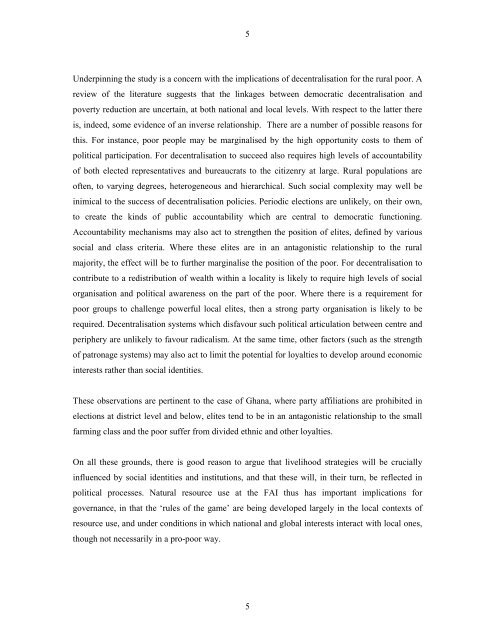Poverty Dimensions of Public Governance and Forest Management ...
Poverty Dimensions of Public Governance and Forest Management ...
Poverty Dimensions of Public Governance and Forest Management ...
Create successful ePaper yourself
Turn your PDF publications into a flip-book with our unique Google optimized e-Paper software.
5<br />
Underpinning the study is a concern with the implications <strong>of</strong> decentralisation for the rural poor. A<br />
review <strong>of</strong> the literature suggests that the linkages between democratic decentralisation <strong>and</strong><br />
poverty reduction are uncertain, at both national <strong>and</strong> local levels. With respect to the latter there<br />
is, indeed, some evidence <strong>of</strong> an inverse relationship. There are a number <strong>of</strong> possible reasons for<br />
this. For instance, poor people may be marginalised by the high opportunity costs to them <strong>of</strong><br />
political participation. For decentralisation to succeed also requires high levels <strong>of</strong> accountability<br />
<strong>of</strong> both elected representatives <strong>and</strong> bureaucrats to the citizenry at large. Rural populations are<br />
<strong>of</strong>ten, to varying degrees, heterogeneous <strong>and</strong> hierarchical. Such social complexity may well be<br />
inimical to the success <strong>of</strong> decentralisation policies. Periodic elections are unlikely, on their own,<br />
to create the kinds <strong>of</strong> public accountability which are central to democratic functioning.<br />
Accountability mechanisms may also act to strengthen the position <strong>of</strong> elites, defined by various<br />
social <strong>and</strong> class criteria. Where these elites are in an antagonistic relationship to the rural<br />
majority, the effect will be to further marginalise the position <strong>of</strong> the poor. For decentralisation to<br />
contribute to a redistribution <strong>of</strong> wealth within a locality is likely to require high levels <strong>of</strong> social<br />
organisation <strong>and</strong> political awareness on the part <strong>of</strong> the poor. Where there is a requirement for<br />
poor groups to challenge powerful local elites, then a strong party organisation is likely to be<br />
required. Decentralisation systems which disfavour such political articulation between centre <strong>and</strong><br />
periphery are unlikely to favour radicalism. At the same time, other factors (such as the strength<br />
<strong>of</strong> patronage systems) may also act to limit the potential for loyalties to develop around economic<br />
interests rather than social identities.<br />
These observations are pertinent to the case <strong>of</strong> Ghana, where party affiliations are prohibited in<br />
elections at district level <strong>and</strong> below, elites tend to be in an antagonistic relationship to the small<br />
farming class <strong>and</strong> the poor suffer from divided ethnic <strong>and</strong> other loyalties.<br />
On all these grounds, there is good reason to argue that livelihood strategies will be crucially<br />
influenced by social identities <strong>and</strong> institutions, <strong>and</strong> that these will, in their turn, be reflected in<br />
political processes. Natural resource use at the FAI thus has important implications for<br />
governance, in that the ‘rules <strong>of</strong> the game’ are being developed largely in the local contexts <strong>of</strong><br />
resource use, <strong>and</strong> under conditions in which national <strong>and</strong> global interests interact with local ones,<br />
though not necessarily in a pro-poor way.<br />
5
















